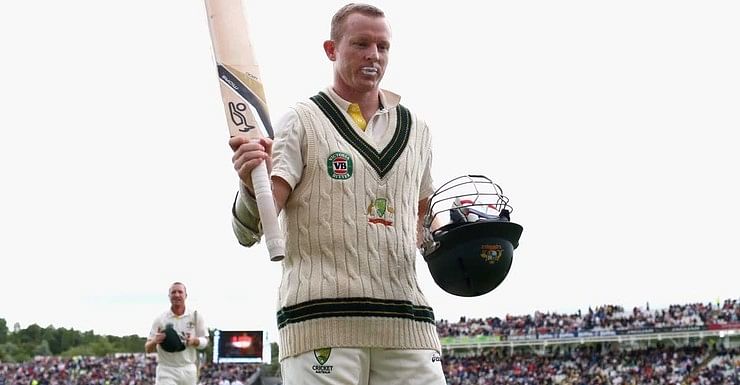
Chris Rogers - The Silent Hero
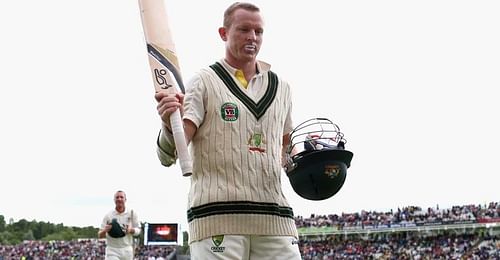
The sounds of celebration echo through the cold English night. England has regained the Ashes. The fabled Ashes urn belongs to them now – at least for another couple of years. The Kevin Pietersen-less England who was ridiculed by the media has come up on top. Regardless of what happens in the final Ashes Test, Australia will go back without another Ashes victory in England.
Meanwhile, Michael Clarke is getting ready for his farewell. His Test career has seen its ups and downs, and now he deserves some peace and quiet. Clarke got a guard of honor from England in the first innings, and he will certainly get another in the second innings as well. But, he will face the music once he gets back to Australia. He will have to answer every question directed at him, and he will, in all probability, receive a medal or a statuette for his services to the nation. Michael Clarke will go into the sunset like the hero he was.
In the corner, another player watches in silence. He is stoic, doesn't display much emotion and often looks politely puzzled as to why he’s there. Chris Rogers, the oldest member of the Australian team, looks on as his beloved captain is praised to high heavens. In the media frenzy over Clarke’s retirement, nobody seems to be remembering that Rogers will also be retiring after the Ashes. But he doesn't really mind. Rogers has never wanted publicity and glory. All he wanted was to make a difference.
A man among giants
The year was 2005. Ricky Ponting’s Australia was touring England in a high-stakes Ashes series. Before the first Test match, Australia had to play Leicestershire county in a 3-day Test match. In the second innings of the match, a diminutive Australian scored a double century for Leicestershire. He had weathered the likes of Brett Lee, Jason Gillespie, Michael Kasprowicz and Stuart Macgill. He scored 209 runs in 219 balls, at a strike rate of 96. His name – Chris Rogers, nicknamed Bucky after the resemblance in name between him and the Australian comic book hero Buck Rogers.

He was good enough to make the team as a solid opening batsman, but the only problem was that there were no vacancies. The Australian team was in its prime during that particular period, and the prominence of big names like Matthew Hayden, Michael Slater, Simon Katich, and Phil Jacques pushed Rogers back into the domestic side, waiting for his golden chance.
Rogers knew that he had no chance of being the first choice pick, so he decided to make full use of the time in domestic cricket. He frequently traveled overseas and played for a number of English counties, making a mountain of runs for each one. He averaged over 70 in the 2005 season and made a telling triple-century in 2006. He then scored a 279 later in the year back at home, which led him to receive the “State Player of the Year” in 2007. His name was slowly pushed up the pecking order, and it seemed that a debut was in store. All that was needed was a vacancy in the national side.
A disastrous debut
Rogers’ chance came in early 2008. India was touring Australia in a series that was making the news for all the wrong reasons. Poor umpiring in the second Test at Sydney had spoilt the spirit of the series, and the third Test in Perth was seen as a new beginning. Matthew Hayden was ruled out of the third Test with a hamstring injury. Rogers was given the baggy green – his dream had come true at last.
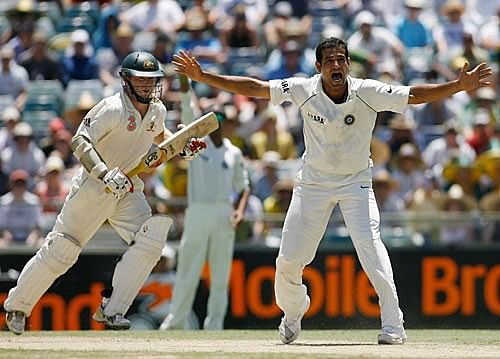
Rogers got off to the worst possible start. He was dismissed for 4 and 15 in the match, and Australia went on to lose the Test. Rogers was quickly written off as incapable. The fact that he was 31 years old didn't help either. His contract was terminated later that year. It came as a blow for Rogers, who had worked so hard on his technique despite being short-sighted and color-blind. But still, he was still unfazed. After the termination of his contract, all Rogers said was that he “Didn't see it coming. I’ll have to accept it and try to get back in.”
Rogers was again a man caught between generations. Legends like Hayden and Gilchrist had retired, paving the way for youngsters like David Warner and Phil Hughes. Nobody wanted to give the aging Rogers another chance. Rogers accepted that he had to fight his way back – again.
Back to the drawing board
Rogers had a stroke of luck when Mahela Jayawardene declared himself unavailable for Derbyshire in the 2008 season. This meant that they had an overseas slot vacant, and Rogers promptly signed up. This would be the start of a glittering overseas career. He carried his bat for Derbyshire, making 248 not out. Rogers had now achieved the feat of scoring a double-century for every overseas team he had represented. As per his usual disinclination of staying in the same club, he moved from Derbyshire to Middlesex in 2011.
Back at home, things were changing at an alarming rate. Ricky Ponting had lost two Ashes series on the trot, the first time that Australia had lost consecutive Ashes since 1986. The media were clamoring for his retirement and the complete reshuffling of the squad. The next Ashes would be held in 2013 – a full two years later. Rogers made that his target.
He played like a man possessed for Middlesex. He made an 87 and a 51* in the One Day Competition and later made another century in the Tests. He then scored a pain-staking 154 runs to help Middlesex avoid a follow-on. His rich run of form continued as he made two more centuries back to back – an unbeaten 138 and a sparkling 173.
He made a lasting contribution throughout the season and capped it off with a final 109 against Warwickshire. He finished as the third highest run scorer with 1108 runs in 17 innings. Rogers made it back home to Australia in time to watch the announcement of the 2013 Ashes team. He crossed his fingers and waited.
A Second Chance
After a gap of five long years, Chris Rogers was picked as part of an international squad. But it still didn't look good for him. Apart from Rogers, the squad had four other regular openers – Shane Watson, Ed Cowan, David Warner and Phillip Hughes. The Australians kept their plans close to the chest, and it was virtually unknown as to who would make the first team. A week before the tour, Darren Lehmann – the Australian coach – announced that Chris Rogers would open with Shane Watson. Rogers was at the doorstep of a miraculous comeback.
He scored a good fifty at Nottingham and a steady 84 at Lord’s. Everybody was impressed by his technique and temperament to play a solid innings without seeing the need to go for quick runs – a mistake which many of his teammates were making. He finally broke the barrier in the fourth Test, scoring his maiden Test century. It had been a long time coming, but Rogers had achieved what he had wanted. He followed it up with a handy 49 in the second innings. It seemed that Australia had found a regular opening batsman.
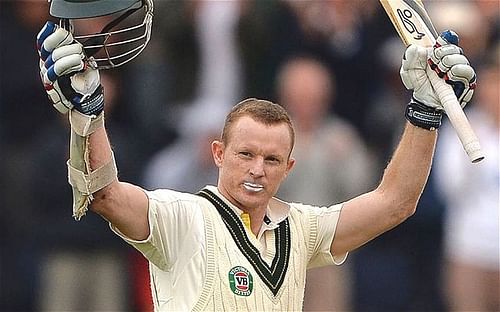
It came as no surprise when Rogers was picked for the 2013-14 Ashes in Australia. He had to prove that he wasn't a one-series wonder. With a bunch of players breathing down his neck, he had to make the opening slot his own. If he managed to give Australia a solid start, they just might get the Ashes back after a long 8 years. The Test was on.
The Immovable Object
If the tour of England was good for Rogers, the series at home was spectacular. Rogers raked in the runs, scoring three fifties in the first seven innings. His ability to stonewall the England fast bowlers gave his partner, David Warner the required incentive to go for the big shots at the other end. While Warner played his shots, Rogers played the orthodox defensive foil.
In the second innings of the fourth Test, he scored a magnificent hundred at the MCG. He followed it up with another hundred in the final Ashes Test, and was one of the best players in the series. Australia decimated England 5-0 and regained the Ashes.
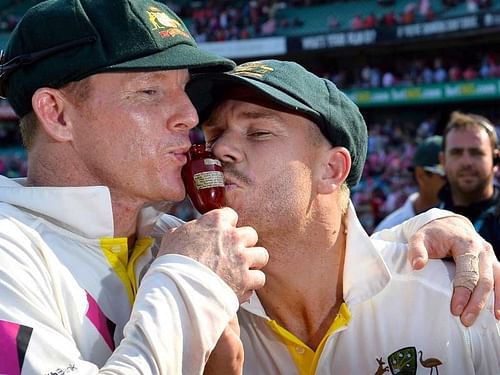
Australia then traveled to South Africa, where Rogers made yet another century at Port Elizabeth. At the age of 36 years, Rogers looked to be at the peak of his career. He then had a lackluster series against Pakistan, but bounced back against India at home, where his rich run of form again found him.
Record-Breaker Rogers
Chris Rogers scored seven consecutive half-centuries in Tests and equaled the record set by Everton Weekes, Kumar Sangakkara, Andy Flower and Shivnarine Chanderpaul. His scores read – 55, 55, 57, 69, 95, 56 and 95 . He had only played 21 Test matches and he was already counted among the greats of the game.
Chris Rogers was once again picked for the 2015 Ashes in England. Affectionately called the “Captain of the Daddy Army”, everyone wondered if his time was near. Rogers broke the silence by announcing that he would retire after the Ashes but made no formal announcement. True to his nature, he made a scintillating 173 in the second Test at Lord’s as Australia squared the series at 1-1.
But from then, everything went downhill. Poor stroke play and unnecessary aggression proved to be Australia’s undoing. They were thoroughly beaten by England in the next two Tests and once again lost the Ashes overseas. Ricky Ponting delivered a scathing attack on the team and announced that at least 8 players in the current squad would never play Tests again. A few days later, Chris Rogers announced his retirement from international cricket after the end of the fifth Test.
Farewell, Bucky
Rogers is someone who defines how Test cricket ought to be played. In the age of fast-paced T20s and ODIs, he brings a calming influence to the middle. He complements David Warner brilliantly, and he shows extreme patience while playing the swinging ball in England.
His ability to play the ball late shows the confidence he has in himself and his crisp off-drives are a delight to watch. The patience he shows in the middle is a call-back to the yesteryear greats and in direct contrast to the current fast-moving generation.
There would be no guard of honor like Michael Clarke’s. There would be no tears shed in the post-match interview. There would be no bronze statuette or shining medal. There would be no extensive media coverage or a home welcome. Rogers has become accustomed to standing the shadow. He would rather enjoy the shade than bask in the glory.
Chris Rogers came into the side as a hasty replacement for Matthew Hayden, he will now go out as one of the most dependable openers Australia ever had. He was the backbone of Australian cricket for the last two years. Perhaps he wasn't the best of stroke makers, but without him, the Australian team would have been in a far worse position than they are now.
To Chris Rogers - the silent hero - goodbye and good luck.